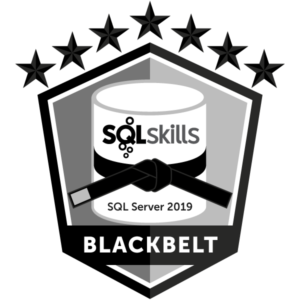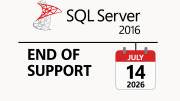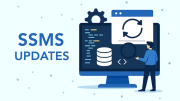Extremely rewarding to be only the 46th person to earn this demanding badge from SQL Skills. It is only achieved after attending SEVEN deeply technical courses focused on Microsoft SQL Server. These courses provide over 155 hours of content and demonstrations. After almost 25 years of using SQL Server, it was nice to get formal training to fill in the knowledge gaps. Especially as I was learning from the best in the industry.
Azure SQL Database and Managed Instances

The first course was on Azure SQL. This includes Databases, Managed Instances, and Virtual Machines. This course provides the training needed to make the right decision about where SQL Server data will reside! Attendees gain a deep understanding of Microsoft Azure with these topics that are covered. Including compliance, networking, active directory integration and maintenance considerations. It also include the topics of high availability/disaster recovery, billing/licensing.
Performance Tuning and Optimzation 1

Next, was starting the first of two intense SQL Server Performance Tuning and Optimization workshops. Now, this is my bread and butter and I absolutely loved seeing this material from a different viewpoint. Topics covered: optimal database creation, data and log internals / maintenance, logging / recovery, indexing for performance, statistics creation / maintenance, locking / blocking, isolation levels, versioning, index fragmentation, and cardinality estimation.
Performance Tuning and Optimzation 2

The second of the SQL Server Performance Tuning and Optimization workshops. This course dives into workload analysis, troubleshooting, and tuning. Topics covered: wait statistics, query store, troubleshooting caching / statistics, CPU troubleshooting, memory troubleshooting, analyzing query performance, extended events, and troubleshooting I/O.
Clustering and Availability Groups

Now we start getting into the smaller two-day courses on specific topics. And I will admit, this is one of the areas that was not my strong suit. So, I was eager to lean in on learning this material that teaches how to plan for, implement, and maintain Always On Failover Clustered Instances and Always On Availability Groups in SQL Server using best practices and real-world experience.
Columnstore Indexes

Two-days on ColumnStore Indexes that teaches the differences between rowstore and columnstore indexes and how to plan for, implement, and maintain columnstore indexes in SQL Server using best practices and the SQL Skills team extensive real-world experience. Topics covered: columnstore structures and usage strategies, DMVs, data loading strategies, maintenance, and partitioning.
Optimizing Performance with Partitioning

This badge shows attendance of the SQL Skills Immersion Event on Very Large Tables: Optimizing Performance and Availability through Partitioning. IEVLT gives attendees insight into how to deal with ever-expanding data sets, how to archive them appropriately, and how to design / architect structures that will perform well now and even as the data continues to grow.
Solving Performance Problems with Query Store

Saving the best for last and one of my favorite tools in SQL Server when it comes to Performance Tuning. This workshop involved solving common performance problems with Query Store. Query Store is a game-changer for data professionals; this course shows you how to stop reacting and make query store work for you. Topics covered: query store fundamentals, understanding query store data, finding performance issues, forcing plans, automatic tuning, query store performance, visualizing query store data.





Be the first to comment on "SQL Skills Blackbelt on SQL Server 2019"